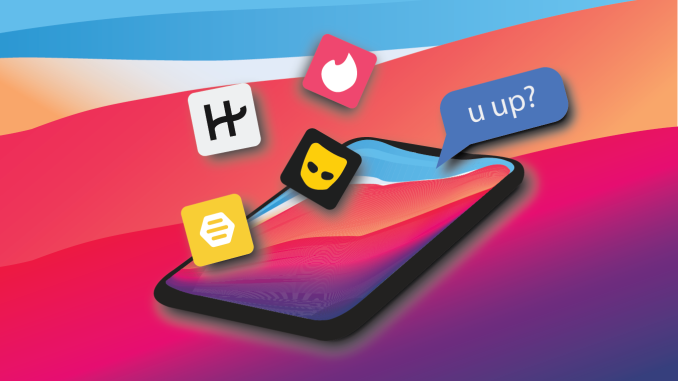
With some of the most popular online dating options, like Tinder, Bumble, Hinge and Grindr, college students can make romantic, sexual and casual connections with a wide range of people.
However, with rising concerns from some college students about the popularity of hookup culture, harassment and false identities on dating apps, students may begin to wonder whether they should be swiping right or left on whether to use dating apps to find their next casual or serious partner.
Nearly half of adults ages 18 to 29 use dating apps, and have had a variety of experiences, whether they be positive, negative or neutral, according to Pew Research Center.
Two students, Jetta Holiday, a senior journalism major, and Sophia Reis, a sophomore communications major, argue for and against the use of dating apps:
Swipe Right
Jetta Holiday, senior journalism major
Dating apps’ easy-to-navigate interfaces, some with options to indicate interest by swiping right or left, allow users to comfortably and casually meet new partners to socialize and have sexual relationships with.
Students should embrace dating apps because they can cultivate casual relationships while mitigating double standards for women who have casual sexual partners by normalizing these connections for all users on the apps. Women’s sexual expression is condemned, while men with the same sexual conduct are celebrated.
“When it comes to sex, women are judged so much more harshly than men,” said Joyce Joyce, an English professor. “Men have so much more freedom.”
By using a dating app, anyone can make themselves available in the dating world and meet people beyond their neighborhood or school. This allows all users, including women, to learn about what they want in a sexual or romantic relationship from a wide array of potential partners.
Dating apps connect users based on preferences, like sexuality and type of relationship, which aren’t immediately obvious when meeting people through face-to-face interaction. Users can learn a lot about a particular person just by looking at their profile, allowing them to easily meet people with similar interests.
Aside from casual sex, dating apps can foster serious relationships. Approximately 25 percent of engaged couples met through online dating, according to a study by The Knot, an online wedding planning resource.
Additionally, dating apps are also popular among adults in the LGBTQ community. Almost 55 percent of lesbian, gay and bisexual adults are likely to use dating apps, according to Pew Research Center. Dating apps, like Hinge, help LGBTQ users connect with each other by allowing users to search for others using sexuality and gender options.
Online dating is a great way for queer couples to meet online, said Nicholas Padula, a senior communications major, who has been in a relationship for nearly a year with his partner whom he met on Hinge.
“You don’t want to seem like you’re coming onto someone who doesn’t have the same sexual orientation,” Padula said. “So it’s just a really safe way to communicate with queer people.”
Dating apps should be recognized for their success in lessening double standards about casual sex, offering non-serious relationships with other users and connecting future couples.
Swipe Left
Sophia Reis, sophomore communications major
Students use dating apps because they are a simple way to create new relationships at college, however, 46 percent of Americans view them as an unsafe way to meet new people, Forbes reported.
Dating violence, like stalking or physical, sexual or psychological violence, has become especially prevalent among college students who use dating apps because of their increasing popularity.
For many students, college is a time to develop genuine connections and experiment with dating, but using dating apps can subject students to harm. Students should avoid using dating apps because they can put students at risk for harassment and overemphasize hookup culture, which condones casual sexual interactions without commitment, according to The Journal.
“Most of them, like Tinder and Hinge and stuff like that, is more just superficial and for hooking up, it’s not actually to build a connection or actually get to know someone,” said Taylor Appleyard, a freshman marketing major.
Nearly half of people on Tinder use it for hooking up, but 42 percent are looking for relationships, according to a 2017 study by Esquire. There’s nothing wrong with searching for hookups, but normalizing them can pressure students into sexual relationships when some users may be uninterested or just searching for a romantic relationship.
Presumed sexual interest can lead to users receiving unwanted explicit messages and feeling pressured to pursue sexual interactions. Fifty-seven percent of adults who use dating apps report being sent a sexually explicit message, even after they said they weren’t interested according to Pew Research Center.
Dating apps can encourage people to lie about their identities and harass students through sexual threats and harmful messages. Approximately 35 percent of women, 14 percent of men and 59 percent of individuals who identified as neither male nor female said they had been harassed online, Global Dating Insights reported.
“I’m not on dating apps and I don’t plan on getting on dating apps ever because I’m scared of the people on there,” said Karly Thrash, a senior psychology major.
While college is an ideal place for students to develop romantic relationships and meet new people, they should consider staying away from dating apps to focus on meaningful in-person connections and prevent unwanted experiences.



Be the first to comment